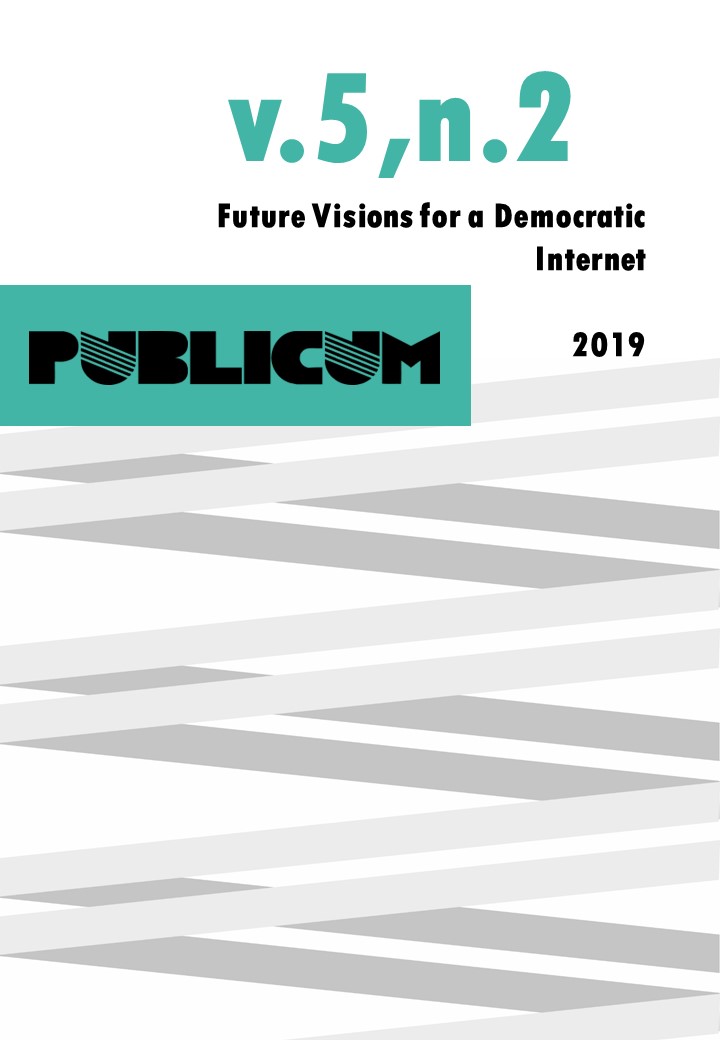Technological Determinism and Democracy in the Governance of the Logical Layer of the Internet | Determinismo tecnológico e democracia na governança da camada lógica da Internet
DOI:
https://doi.org/10.12957/publicum.2019.47200Palavras-chave:
Internet Governance, Technological Determinism, Governing Mentalities, Technocracy, Logical Layer. | Governça da internet, Determinismo tecnológico, Mentalidades governantes, Tecnocracia, Camadas de lógica.Resumo
Abstract: The article focuses on the relationship between the Internet Governance and democracy on the governance of the logical layer of the Internet.Due to the impactful role and the normative effects of standards, protocols and technical decisions for the Internet and Internet users, and the centrality of the Internet in almost every aspect of thesocial, financial and political life, it argues thatwe ought to examine the ideologies, narratives and assumptions that have informed and shaped key governance arrangements.It explores the influence of technological determinism as a technocratic governing mentality, applying the argument of Taylor Dotson in the context of Internet Governance, and more specifically on the governance of the logical layer, focusing on standard-setting and technical decision-making by the Internet Engineering Task Force (IETF).It argues that technological determinism has been pervasive in Internet Governance discoursesince the early days of the Internet, while standard-setting and technical decision-making are technocratically organized and non-democratic procedures, considering also how the technical community takes decisions, as well as how itself frames its tasks and perceives standard-setting and technical decision-making.It concludes arguing that we need to review the way governance on the logical layer is organized, dispelling technological determinism, while introducing social considerations and democratic principles.
Resumo: O artigo aborda a relação entre Governança e democracia na camada lógica da Internet. Devido ao impacto e aos efeitos normativos dos padrões, protocolos e decisões técnicas para a Internet e para os seus usuários, e à centralidade da Internet em quase todos os aspectos da vida social, financeira e política, argumenta-se que devemos examinar as ideologias, narrativas e suposições que informaram e moldaram os principais arranjos de governança. Explora-se a influência do determinismo tecnológico como uma mentalidade governante tecnocrática, aplicando a argumento de Taylor Dotson no contexto da Governança da Internet e, mais especificamente, na governança da camada lógica, com foco na definição de padrões e na tomada de decisões técnicas pela Internet Engineering Task Force (IETF). Argumenta-se que o determinismo tecnológico tem sido difundido nos discursos de Governança da Internet desde os primeiros dias da Internet, enquanto padronizações e tomadas de decisão são procedimentos tecnocraticamente organizados e não democráticos, considerando como a comunidade técnica toma decisões, bem como como ela mesma define suas tarefas e percebe a definição de padrões e a tomada de decisões técnicas. Conclui-se argumentando que precisamos revisar a forma como a governança na camada lógica é organizada, dissipando o determinismo tecnológico, e introduz-se considerações sociais e princípios democráticos.
Downloads
Publicado
Como Citar
Edição
Seção
Licença
O autor do trabalho declara conhecer e concordar com as regras a seguir:
1) Realizou o trabalho apresentado à revista, sendo inteiramente responsável pelas ideias e conceitos nele emitidos, que não correspondem, necessariamente, ao ponto de vista dos Editores de Publicum.
2) Obedeceu, na realização do trabalho, os princípios éticos aludidos na política de avaliação da revista[RDN1] .
3) Assume a autoria e a responsabilidade pela obra, declarando que ela não infringe quaisquer direitos de propriedade intelectual de terceiros.
4) Responsabiliza-se, integralmente, por danos de natureza moral ou patrimonial que a veiculação da obra venha a gerar a terceiros.
5) Cede à revista os direitos de reprodução, edição e primeira publicação do trabalho em qualquer meio midiático, em particular sob forma digital, em arquivo eletrônico online na internet.
6) Confere aos Editores o direito de modificar o texto apresentado, sem prejuízo de seu conteúdo, quando necessário para uniformizar a apresentação dos trabalhos e para atender as normas de edição próprias da revista.
7) Concorda com a forma final do trabalho aprovada pela revista.
8) Autoriza a divulgação do trabalho nos canais de comunicação da Faculdade de Direito da UERJ.
9) Concorda com a reprodução de pequenos trechos do trabalho em outras publicações da UERJ.
10) Reconhece que, pela cessão e autorizações acima referidas, não receberá remuneração sob qualquer modalidade, tendo estas o caráter de colaboração científica.
11) Tem ciência de que a publicação do trabalho poderá ser recusada caso não considerada conveniente, por qualquer motivo que seja, sendo que tal recusa não gera responsabilidade e/ou ônus de espécie alguma à revista ou UERJ.
[RDN1]Ver COPE.

Publicum está licenciado com uma Licença Creative Commons Atribuição-NãoComercial 4.0 Internacional.

